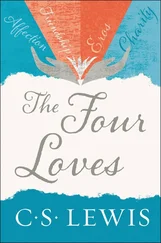We can thus detect the pride of Friendship—whether Olympian, Titanic, or merely vulgar—in many circles of Friends. It would be rash to assume that our own is safe from its danger; for of course it is in our own that we should be slowest to recognise it. The danger of such pride is indeed almost inseparable from Friendly love. Friendship must exclude. From the innocent and necessary act of excluding to the spirit of exclusiveness is an easy step; and thence to the degrading pleasure of exclusiveness. If that is once admitted the downward slope will grow rapidly steeper. We may never perhaps become Titans or plain cads; we might—which is in some ways worse—become "Souls". The common vision which first brought us together may fade quite away. We shall be a coterie that exists for the sake of being a coterie ; a little self–elected (and therefore absurd) aristocracy, basking in the moonshine of our collective self–approval.
Sometimes a circle in this condition begins to dabble in the world of practice. Judiciously enlarging itself to admit recruits whose share in the original common interest is negligible but who are felt to be (in some undefined sense) "sound men", it becomes a power in the land. Membership of it comes to have a sort of political importance, though the politics involved may be only those of a regiment, a college, or a cathedral close. The manipulation of committees, the capture of jobs (for sound men) and the united front against the Have–nots now become its principal occupation, and those who once met to talk about God or poetry now meet to talk about lectureships or livings. Notice the justice of their doom. "Dust thou art and unto dust shalt thou return," said God to Adam. In a circle which has thus dwindled into a coven of wanglers Friendship has sunk back again into the mere practical Companionship which was its matrix. They are now the same sort of body as the primitive horde of hunters. Hunters, indeed, is precisely what they are; and not the kind of hunters I most respect.
The mass of the people, who are never quite right, are never quite wrong. They are hopelessly mistaken in their belief that every knot of friends came into existence for the sake of the pleasures of conceit and superiority. They are, I trust, mistaken in their belief that every Friendship actually indulges in these pleasures. But they would seem to be right in diagnosing pride as the danger to which Friendships are naturally liable. Just because this is the most spiritual of loves the danger which besets it is spiritual too. Friendship is even, if you like, angelic. But man needs to be triply protected by humility if he is to eat the bread of angels without risk.
Perhaps we may now hazard a guess why Scripture uses Friendship so rarely as an image of the highest love. It is already, in actual fact, too spiritual to be a good symbol of Spiritual things. The highest does not stand without the lowest. God can safely represent Himself to us as Father and Husband because only a lunatic would think that He is physically our sire or that His marriage with the Church is other than mystical. But if Friendship were used for this purpose we might mistake the symbol for the thing symbolised. The danger inherent in it would be aggravated. We might be further encouraged to mistake that nearness (by resemblance) to the heavenly life which Friendship certainly displays for a nearness of approach.
Friendship, then, like the other natural loves, is unable to save itself. In reality, because it is spiritual and therefore faces a subtler enemy, it must, even more whole–heartedly than they, invoke the divine protection if it hopes to remain sweet. For consider how narrow its true path is. It must not become what the people call a "mutual admiration society"; yet if it is not full of mutual admiration, of Appreciative love, it is not Friendship at all. For unless our lives are to be miserably impoverished it must be for us in our Friendships as it was for Christiana and her party in The Pilgrim's Progress :
They seemed to be a terror one to the other, for that they could not see that glory each one on herself which they could see in each other. Now therefore they began to esteem each other better than themselves. For you are fairer than I am, said one; and you are more comely than I am, said another.
There is in the long run only one way in which we can taste this illustrious experience with safety. And Bunyan has indicated it in the same passage. It was in the House of the Interpreter, after they had been bathed, sealed and freshly clothed in "White Raiment" that the women saw one another in this light. If we remember the bathing, sealing and robing, we shall be safe. And the higher the common ground of the Friendship is, the more necessary the remembrance. In an explicitly religious Friendship, above all, to forget it would be fatal.
For then it will seem to us that we—we four or five—have chosen one another, the insight of each finding the intrinsic beauty of the rest, like to like, a voluntary nobility; that we have ascended above the rest of mankind by our native powers. The other loves do not invite the same illusion. Affection obviously requires kinships or at least proximities which never depended on our own choice. And as for Eros, half the love songs and half the love poems in the world will tell you that the Beloved is your fate or destiny, no more your choice than a thunderbolt, for "it is not in our power to love or hate". Cupid's archery, genes—anything but ourselves. But in Friendship, being free of all that, we think we have chosen our peers. In reality, a few years' difference in the dates of our births, a few more miles between certain houses, the choice of one university instead of another, posting to different regiments, the accident of a topic being raised or not raised at a first meeting—any of these chances might have kept us apart. But, for a Christian, there are, strictly speaking, no chances. A secret Master of the Ceremonies has been at work. Christ, who said to the disciples "Ye have not chosen me, but I have chosen you", can truly say to every group of Christian friends "You have not chosen one another but I have chosen you for one another". The Friendship is not a reward for our discrimination and good taste in finding one another out. It is the instrument by which God reveals to each the beauties of all the others. They are no greater than the beauties of a thousand other men; by Friendship God opens our eyes to them. They are, like all beauties, derived from Him, and then, in a good Friendship, increased by Him through the Friendship itself, so that it is His instrument for creating as well as for revealing. At this feast it is He who has spread the board and it is He who has chosen the guests. It is He, we may dare to hope, who sometimes does, and always should, preside. Let us not reckon without our Host.
Not that we must always partake of it solemnly. "God who made good laughter" forbid. It is one of the difficult and delightful subtleties of life that we must deeply acknowledge certain things to be serious and yet retain the power and will to treat them often as lightly as a game. But there will be a time for saying more about this in the next chapter. For the moment I will only quote Dunbar's beautifully balanced advice:
Man, please thy Maker, and be merry,
And give not for this world a cherry.
By Eros I mean of course that state which we call "being in love"; or, if you prefer, that kind of love which lovers are "in". Some readers may have been surprised when, in an earlier chapter, I described Affection as the love in which our experience seems to come closest to that of the animals. Surely, it might be asked, our sexual functions bring us equally close? This is quite true as regards human sexuality in general. But I am not going to be concerned with human sexuality simply as such. Sexuality makes part of our subject only when it becomes an ingredient in the complex state of "being in love". That sexual experience can occur without Eros, without being "in love", and that Eros includes other things besides sexual activity, I take for granted. If you prefer to put it that way, I am inquiring not into the sexuality which is common to us and the beasts or even common to all men but into one uniquely human variation of it which develops within "love"—what I call Eros. The carnal or animally sexual element within Eros, I intend (following an old usage) to call Venus. And I mean by Venus what is sexual not in some cryptic or rarified sense—such as a depth–psychologist might explore—but in a perfectly obvious sense; what is known to be sexual by those who experience it; what could be proved to be sexual by the simplest observations.
Читать дальше











